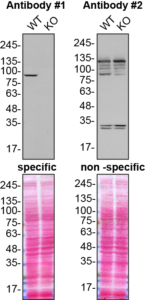TREAT-AD is partnering with YCharOS to provide antibody characterization for understudied AD targets
By Zoë Leanza
To de-risk understudied therapeutic targets, the TREAT-AD research center is partnering with YCharOS, a new organization seeking to identify high-quality antibodies for all human proteins, starting with proteins linked to neurodegenerative diseases. Together, the initiative is providing antibody characterization reports through an open access repository.
The National Institute on Aging (NIA) launched Target Enablement to Accelerate Therapy Development for Alzheimer’s Disease (TREAT-AD) in 2019 to provide a rigorous scientific foundation for researchers to pursue novel ideas. The targets identified by the Accelerating Medicines Partnership – Alzheimer’s Disease Target Discovery and Preclinical Validation (AMP-AD) program inform the bioinformatics approach of TREAT-AD, which then releases antibody validation reports free-of-charge to the scientific community.
So, why characterize antibodies?
There are millions of antibodies for more than 20,000 proteins; and their efficacy is variable. YCharOS (Antibody Characterization through Open Science) tests these antibodies, thus allowing scientists to select the best antibody(ies) for their experiments.
Much like companies that offer crash test results of cars made by different manufacturers, YCharOS is an unbiased organization that provides head to head comparisons of antibodies from various commercial sources.
“We don’t rate the antibodies. We just present the raw data and let scientists make their own judgments,” said CEO Chetan Raina. This way, scientists can make informed decisions about the choice of experimental tools in order to reduce false positives or false negatives.
“The most cited antibodies are not necessarily the best antibodies,” said YCharOS’s CSO Carl Laflamme. He explained that researchers in the United States waste $350 million each year on antibodies that don’t work.
Hoping to mitigate that statistic, the team at YCharOS developed a series of tests which involve cells created using CRISPR/Cas9, the Nobel Prize winning technology that acts as molecular “scissors.” By using this technology, the YCharOS team was able to develop an antibody testing method that is superior to what was previously available.
As the YCharOS team begins their study of TREAT-AD proteins, recent results are encouraging. They have been able to find high-quality antibodies for the vast majority of the targets tested so far.
The service is also valuable to manufacturers, providing data at a fixed cost too expensive for any individual company. Several leading manufacturers have already submitted more than 450 antibodies from their catalogs to be tested.
Publicly available antibody validation reports provide data for genes of interest in the AD research community – including MSN, PRDX1, INPP5D, and CD44.
“We’re as transparent as possible. No patents, no paywalls, no restrictions on data re-use,” said Raina, “because we need to let scientists see our data to select the best products, perform experiments with confidence, and ultimately change the way we treat disease.”

Western blot (left): Two different commercial antibodies targeting an AMP-AD-nominated target tested side-by-side by Western blot. Antibody #1 detects only one protein (one band) in the WT lane, and the band disappears in the KO lane, as expected for a specific antibody. Antibody #2 recognizes many bands in both lanes. Antibody #2 is thus not specific for the intended target. Unfortunately, antibody #2 is the most cited and used antibody in the scientific literature.
Science is collaborative. In addition to the researchers mentioned, Peter McPherson, Distinguished James McGill Professor at The Montreal Neurological Institute, and The Structural Genomics Consortium had major contributions to this work.
For more information, view all YCharOS antibody characterization reports.


